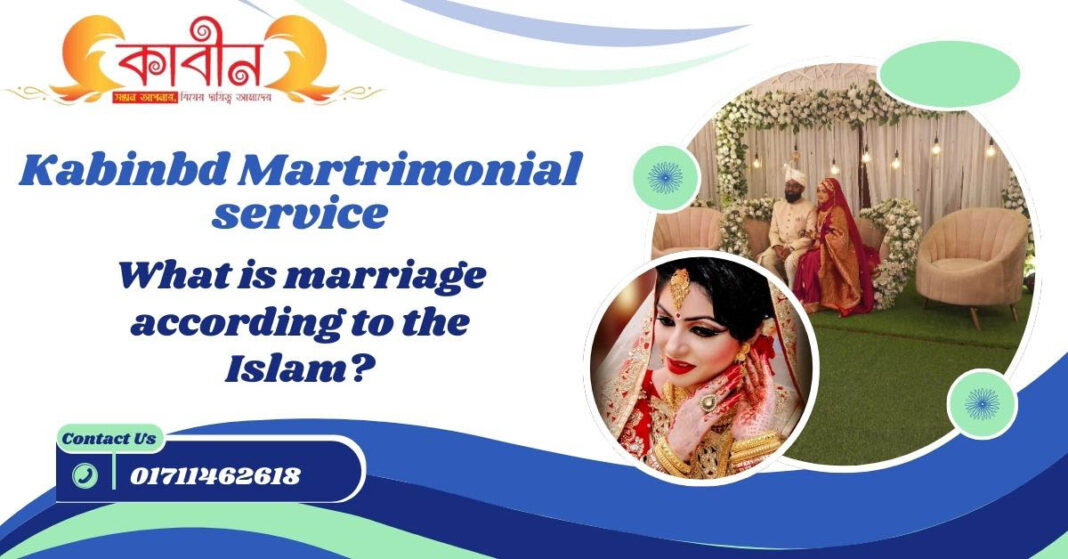What is marriage according to the Islam?
Introduction
Marriage in Islam, known as Nikah, is a solemn and sacred social contract between a man and a woman. This contract is not merely a legal agreement but a spiritual and moral covenant that signifies a profound commitment to a shared life guided by mutual respect, love, and responsibility. In Islam, marriage is highly recommended and is considered a significant part of a Muslim’s life, fulfilling both religious and social purposes.
The Concept of Marriage in Islam
Marriage in Islam is viewed as an institution that provides a lawful framework for the fulfillment of human desires, the establishment of a family, and the continuation of the human race. It is also a means of providing emotional and physical companionship and support, which is essential for leading a balanced and fulfilling life.
The Quran emphasizes the importance of marriage by referring to it as a source of tranquility and mercy. In Surah Ar-Rum (30:21), Allah says:
“And among His signs is that He created for you from yourselves mates that you may find tranquility in them, and He placed between you affection and mercy. Indeed, in that are signs for a people who give thought.”
This verse highlights the spiritual and emotional dimensions of marriage, portraying it as a relationship that brings peace and compassion to both partners. Marriage in Islam, known as Nikah, is considered a sacred and fundamental institution that plays a vital role in the life of a Muslim. It is not merely a social contract but a significant religious duty that fulfills both spiritual and social objectives. The concept of marriage in Islam encompasses legal, ethical, emotional, and spiritual dimensions, making it one of the most important aspects of a Muslim’s life.
Marriage as a Divine Institution
In Islam, marriage is seen as a divinely ordained institution, one that is encouraged and highly valued. The Quran and Hadith (sayings of the Prophet Muhammad, peace be upon him) emphasize the importance of marriage as a means to fulfill the natural human desire for companionship and procreation. It is also viewed as a means of maintaining moral integrity and social order.
The Quran describes marriage as a source of peace and mercy between spouses. In Surah Ar-Rum (30:21), Allah says:
“And among His signs is that He created for you from yourselves mates that you may find tranquility in them, and He placed between you affection and mercy. Indeed, in that are signs for a people who give thought.”
This verse highlights the spiritual and emotional dimensions of marriage, portraying it as a relationship that brings peace and compassion to both partners. The use of terms like “tranquility,” “affection,” and “mercy” underscores the deep connection and bond that marriage is intended to create between a husband and wife.
The Purpose of Marriage in Islam

Marriage in Islam serves several essential purposes, all of which are deeply rooted in the religion’s ethical and spiritual teachings:
- Fulfillment of Natural Desires: Islam acknowledges that human beings have natural desires for companionship and intimacy. Marriage provides a lawful and moral way to fulfill these desires, thereby preventing sinful behavior. It is seen as a means of preserving chastity and maintaining moral integrity.
- Procreation and Family Life: One of the primary purposes of marriage is to ensure the continuation of the human race. Children are considered a blessing from Allah, and marriage provides the appropriate framework for raising children in a stable and loving environment. The family unit, established through marriage, is the cornerstone of Islamic society.
- Mutual Support and Companionship: Marriage is a partnership where both spouses provide emotional, physical, and spiritual support to each other. It is a relationship built on mutual respect, love, and responsibility. The Quran and Hadith emphasize the importance of kindness, compassion, and fairness in marital relationships.
The Legal and Ethical Framework of Marriage
Islamic marriage is governed by a detailed legal and ethical framework designed to protect the rights and responsibilities of both spouses. This framework ensures that the marriage is conducted in a lawful manner and that the relationship between husband and wife is based on justice, fairness, and mutual respect.
- The Marriage Contract (Nikah): The Nikah is the formal and binding contract that signifies the union between a man and a woman. It requires the mutual consent of both parties and the presence of witnesses to be valid. The contract includes stipulations such as the Mahr (dower), which is a mandatory gift from the husband to the wife.
- Rights and Responsibilities: Islam outlines specific rights and responsibilities for both spouses. The husband is responsible for providing financial support (Nafaqah), while the wife has the right to be treated with kindness and respect. Both spouses are expected to fulfill each other’s emotional and physical needs.
- The Role of the Wali (Guardian): In the case of a woman, the presence and consent of a guardian (Wali) is required for the marriage to be valid. The Wali, typically the father or another male relative, ensures that the marriage is in the best interest of the bride.
- Witnesses: The presence of witnesses during the marriage ceremony is essential to ensure that the marriage is conducted openly and in accordance with Islamic law. The witnesses also serve to protect the rights of both parties.
- Public Announcement: While not a legal requirement, it is recommended that the marriage be publicly announced. This helps to prevent any confusion or doubt regarding the marital status of the individuals involved.
The Ethical Conduct of Marriage
The ethical conduct of marriage in Islam is guided by the principles of kindness, compassion, and mutual respect. The Quran and Hadith provide numerous teachings on how spouses should treat each other to ensure a harmonious and fulfilling relationship.
Challenges in Marriage and Islamic Guidance
Marriage, like any human relationship, can face challenges and difficulties. Islam provides guidance on how to address these challenges to ensure that the marriage remains strong and healthy.
- Resolving Conflicts: Islam encourages spouses to resolve conflicts through dialogue, patience, and mutual understanding. The Quran advises that if disputes arise, both parties should seek to reconcile their differences, and if necessary, involve family members or mediators to help resolve the issue.
- Seeking Counseling: If marital problems persist, Islam encourages couples to seek counseling from trusted family members, religious scholars, or professional counselors. This can help them find solutions to their problems and strengthen their relationship.
- Separation and Divorce: While divorce is permissible in Islam, it is considered a last resort and is discouraged unless absolutely necessary. The Prophet Muhammad (peace be upon him) said:
“The most hated of permissible things to Allah is divorce.” (Sunan Abu Dawood)
Before resorting to divorce, couples are encouraged to exhaust all possible means of reconciliation, including seeking mediation and counseling. If divorce becomes inevitable, it should be conducted in a respectful and dignified manner, with the rights of both parties being honored.
The Role of Family and Community in Marriage
Marriage in Islam is not just a union between two individuals but a merging of families and an integral part of the broader Muslim community. Families and the community play a crucial role in supporting the marriage and helping the couple build a strong and stable relationship.
The concept of marriage in Islam is comprehensive, encompassing legal, ethical, emotional, and spiritual dimensions. Marriage is seen as a divinely ordained institution that fulfills both individual and social objectives. It provides a lawful and moral framework for companionship, procreation, and the establishment of a stable family unit.
The Purpose of Marriage in Islam
Marriage in Islam serves several key purposes:
- Fulfillment of Natural Desires: Islam recognizes the natural human instinct for love and companionship. Marriage provides a lawful and moral means to satisfy these desires, thereby preventing sinful behavior.
- Procreation and Raising Children: One of the primary objectives of marriage is to ensure the continuation of the human race. Children born within a marital union are considered a blessing, and parents are tasked with raising them in accordance with Islamic principles.
- Mutual Support and Companionship: Marriage provides emotional and physical support to both partners. It is a partnership where each spouse has rights and responsibilities towards the other, ensuring that both partners help each other in leading a righteous life.
The Legal Framework of Marriage in Islam
Marriage in Islam is governed by a set of rules and regulations derived from the Quran and the Hadith (sayings and actions of the Prophet Muhammad, peace be upon him). These rules ensure that the marriage is conducted in a lawful manner and that the rights and responsibilities of both parties are clearly defined.
The Nikah Contract
The marriage contract, known as Nikah, is the central element of an Islamic marriage. It is a formal and binding agreement between the husband and wife, and it requires the presence of witnesses to be valid. The key components of a Nikah include:
- Offer and Acceptance (Ijab and Qabul): The marriage contract begins with an offer (Ijab) from one party, usually the bride’s guardian, and acceptance (Qabul) by the other party, typically the groom. This exchange signifies the mutual consent of both parties to the marriage.
- Mahr (Dower): The Mahr is a mandatory gift given by the groom to the bride at the time of marriage. It can be in the form of money, property, or any other valuable item. The amount and nature of the Mahr are agreed upon by both parties before the marriage. The Mahr is the exclusive right of the bride, and she can use it as she wishes.
- Witnesses: For the marriage to be valid, it must be witnessed by at least two adult Muslim males or one male and two female witnesses. The presence of witnesses ensures that the marriage is conducted transparently and in accordance with Islamic law.
- Consent of the Wali (Guardian): In the case of a woman, the consent of her guardian (Wali), typically her father or another male relative, is required for the marriage to be valid. The Wali’s role is to ensure that the marriage is in the best interest of the bride.
- Public Announcement: While not mandatory, it is recommended that the marriage be publicly announced to the community. This public declaration helps to prevent any doubts or misunderstandings about the marital status of the individuals involved.
Rights and Responsibilities of Spouses
Islam outlines the rights and responsibilities of both spouses to ensure a harmonious and balanced marital relationship. These rights and responsibilities are based on the principles of justice, equality, and mutual respect.
- Rights of the Wife:
- Financial Support (Nafaqah): The husband is obligated to provide for his wife’s financial needs, including food, clothing, shelter, and medical care, according to his means.
- Mahr: The wife has the right to receive the agreed-upon Mahr from her husband.
- Kind Treatment: The wife has the right to be treated with kindness, respect, and dignity by her husband.
- Emotional and Physical Fulfillment: The husband must fulfill his wife’s emotional and physical needs, ensuring her happiness and well-being.
- Privacy and Independence: The wife has the right to privacy and autonomy within her marriage. The husband should respect her personal space and not infringe upon her rights.
- Rights of the Husband:
- Obedience: The wife is expected to obey her husband in matters that are lawful and reasonable. This obedience is not absolute and does not extend to actions that go against Islamic principles.
- Respect and Honor: The husband has the right to be respected and honored by his wife.
- Custody of Children: In most cases, the husband has the primary responsibility for the upbringing and financial support of the children. However, the wife also plays a crucial role in their upbringing and education.
- Fidelity: The wife is expected to be faithful to her husband and to protect his honor and dignity.
The Role of Love and Compassion in Marriage
In Islam, love and compassion are considered essential components of a successful marriage. The Prophet Muhammad (peace be upon him) emphasized the importance of treating one’s spouse with kindness and affection. He said:
“The best of you are those who are best to their wives, and I am the best of you to my wives.” (Sunan Ibn Majah)
This Hadith underscores the importance of maintaining a loving and compassionate relationship with one’s spouse. Marriage is not just a legal contract but a union based on love, understanding, and mutual respect. Both partners are encouraged to express their love and care for each other and to work together to build a strong and enduring relationship.
Challenges in Marriage and How Islam Addresses Them
Like any human relationship, marriage can face challenges and difficulties. Islam provides guidance on how to address these challenges to ensure that the marriage remains strong and healthy.
- Communication: Effective communication is crucial in resolving conflicts and misunderstandings in marriage. Islam encourages spouses to communicate openly and honestly with each other and to resolve disputes amicably.
- Patience and Forgiveness: Patience and forgiveness are essential virtues in maintaining a successful marriage. Islam teaches that both spouses should be patient with each other’s shortcomings and should be quick to forgive when mistakes are made.
- Seeking Counseling: If a marriage faces serious difficulties, Islam encourages the couple to seek counseling and advice from trusted family members, religious scholars, or professional counselors. This can help them find solutions to their problems and strengthen their relationship.
- Separation and Divorce: While divorce is permissible in Islam, it is considered a last resort and is discouraged unless absolutely necessary. The Prophet Muhammad (peace be upon him) said:
“The most hated of permissible things to Allah is divorce.” (Sunan Abu Dawood)
Before resorting to divorce, couples are encouraged to exhaust all possible means of reconciliation, including seeking mediation and counseling. If divorce becomes inevitable, it should be conducted in a respectful and dignified manner, with the rights of both parties being honored.
The Role of Family and Community in Marriage
In Islam, marriage is not just a union between two individuals but a merging of families and an integral part of the broader Muslim community. Families play a crucial role in supporting the marriage and helping the couple build a strong and stable relationship.
- Parental Guidance and Support: Parents and elders are encouraged to provide guidance and support to their children before and after marriage. This includes helping them choose a suitable partner, offering advice on marital issues, and providing emotional and financial support if needed.
- Community Involvement: The Muslim community also plays a role in supporting marriages. This can include organizing marriage preparation courses, offering counseling services, and providing a support network for couples.
- Social and Moral Support: The community is expected to uphold the moral values of Islam and to discourage behaviors that could harm marriages, such as gossip, infidelity, and exploitation.
Conclusion
Marriage in Islam is a sacred and significant institution that goes beyond a mere legal contract. It is a profound spiritual and moral commitment that brings together two individuals in a partnership based on love, respect, and mutual responsibility. Through marriage, Muslims fulfill their natural desires, build strong families, and contribute to the moral and social fabric of society.
Islam provides a comprehensive framework for marriage, ensuring that the rights and responsibilities of both spouses are respected and that their relationship is nurtured with love, compassion, and understanding. By following these principles, Muslims can build strong and enduring marriages that bring peace, happiness, and spiritual fulfillment to their lives.
Best Bangladeshi Matrimony Sites in the world
আপনি যদি বিয়ের ব্যাপারে সিরিয়াস হয়ে থাকেন তবে
লিংকে ক্লিক করে ফ্রী রেজিষ্ট্রেশন করুন
অথবা বিস্তারিত জানতেঃ
Gmail:kabinbd4@gmail.com
01711462618 এ কল করুন ২৪/৭ সার্ভিস

























